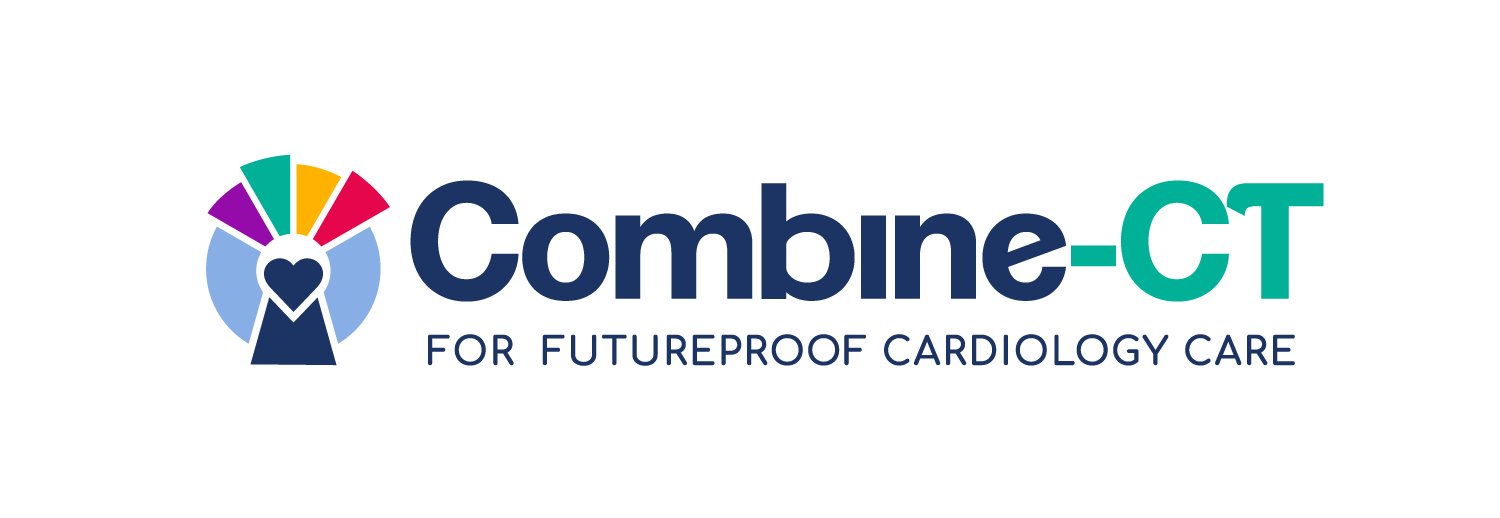Summary
In coronary artery disease (CAD), plaques made up of fat and calcium build up in the arteries, gradually narrowing them and blocking the flow of blood to the heart. It affects around 5% of people in the EU and is a leading cause of death.
According to current clinical guidelines in the EU, UK and US, patients suspected of having CAD should first have a scan called a coronary computed tomography angiography (CCTA). CCTA is non-invasive and uses X-rays and computer processing to create a detailed 3D image of the coronary arteries. It therefore allows doctors to accurately assess how blocked a patient’s arteries are and helps to determine whether the patient needs an invasive procedure such as an operation to manage their condition or if medication would be enough.
In practice, challenges with interoperability across systems, devices, and geographies mean that CCTA is not being used to its full potential. As a result, an estimated 60% of patients still undergo invasive tests such as invasive coronary angiography (ICA) for CAD unnecessarily. In an ICA, a catheter is inserted into the blood vessels at the groin or arm and guided to the heart area where it releases a contrast medium that shows up on X-rays.
The goal of the COMBINE-CT project is to deliver an automated CCTA-enabled workflow that will improve and connect the different steps in the care of CAD patients, ranging from diagnosis to treatment planning, treatment procedure, and follow-up. Artificial intelligence (AI) powered algorithms will make it easier than ever to definitively diagnose CAD, select the right treatment for the right patient, plan interventions, use this information during an invasive procedure, and ensure patients are followed up appropriately.
The project brings together experts in cardiology, imaging, surgery, and artificial intelligence as well as health economists and patient organisations. Together, they will carry out five multi-centre studies to generate evidence on the benefits of computed tomography (CT) scans across the CAD care pathway. Among other things, these studies will investigate the value of CT for definitive CAD diagnosis, treatment planning and support, and explore how a technique called photon counting spectral CT can be used to evaluate coronary artery bypass grafts and previously implanted stents.
While COMBINE-CT focuses on heart disease, the project hopes that its findings will also prove useful to other disease areas where CT scans are widely used.
Participants
Show participants on mapUniversities, research organisations, public bodies, non-profit groups
- Consorcio Centro De Investigacion Biomedica En Red M.P., Madrid, Spain
- Fundacion Instituto De Estudios De Ciencias De La Salud De Castilla Y Leon, Soria, Spain
- Klinikum Der Universitaet Zu Koeln, Cologne, Germany
- Medical Research Infrastructure Development And Health Services Fund By The Sheba Medical Center, Ramat Gan, Israel
- Stichting Amsterdam Umc, Amsterdam, Netherlands
- Stichting Cardiologie Centra Nederland, Utrecht, Netherlands
- Stichting Eupati Foundation, Utrecht, Netherlands
- Universite Lyon 1 Claude Bernard, Villeurbanne, France
Third parties
- Hospices Civils De Lyon, lyon, France
IHI industry partners
- Novo Nordisk A/S, Bagsvaerd, Denmark
- Philips Medical Systems Nederland BV, Best, Netherlands
- Philips Medical Systems Technologies LTD, Haifa, Israel
| Participants | |
|---|---|
| Name | EU funding in € |
| Consorcio Centro De Investigacion Biomedica En Red M.P. | 176 670 |
| Fundacion Instituto De Estudios De Ciencias De La Salud De Castilla Y Leon | 521 153 |
| Klinikum Der Universitaet Zu Koeln | 429 153 |
| Medical Research Infrastructure Development And Health Services Fund By The Sheba Medical Center | 460 000 |
| Philips Medical Systems Nederland BV | 2 875 085 |
| Philips Medical Systems Technologies LTD | 190 000 |
| Stichting Amsterdam Umc | 779 019 |
| Stichting Cardiologie Centra Nederland | 406 779 |
| Stichting Eupati Foundation | 129 250 |
| Universite Lyon 1 Claude Bernard | 210 300 |
| Third parties | |
| Name | Funding in € |
| Hospices Civils De Lyon | 347 013 |
| Total Cost | 6 524 422 |
